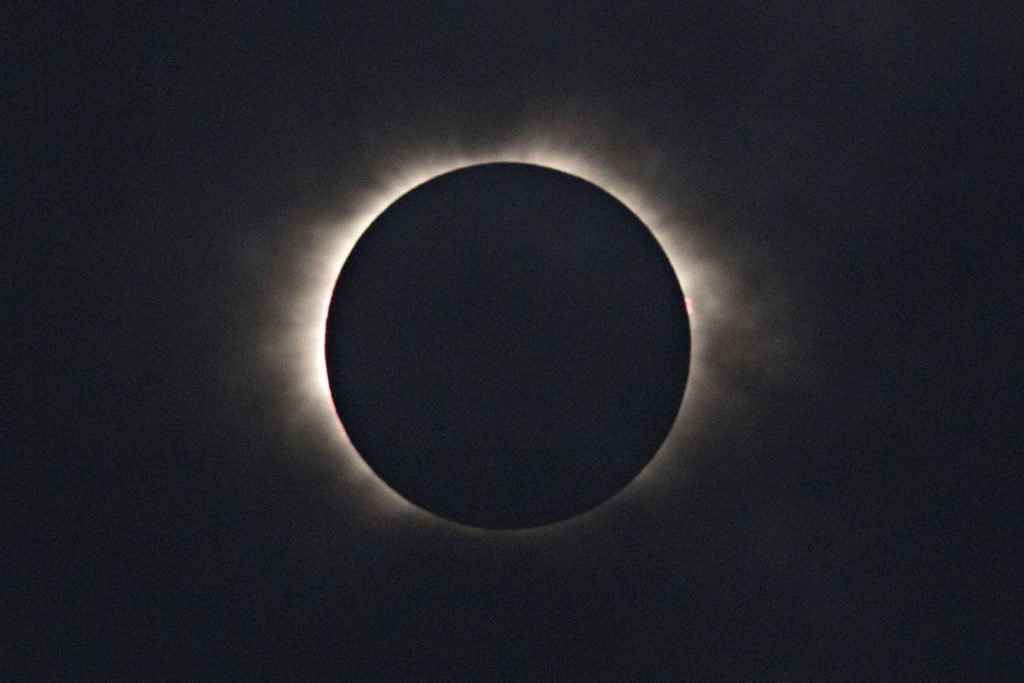The solar eclipse is a phenomenon where the Sun, when observed from the Earth’s surface, is completely or partially blocked out by the Moon. One of the total solar eclipse facts says for the phenomenon to occur, the Moon, the Earth and the Sun must be in a straight line. To clearly observe the total solar eclipse is even rarer since it can be viewed only from a few parts of the world at a time. And even if you are at the right place, observing a total solar eclipse or even a solar eclipse can depend on reasons like weather or clear sky. So if you are lucky you might get to see the first total solar eclipse of 2019 on Tuesday (July 2, 2019).
Next solar eclipse will occur on December 26, 2019. It will be an annular solar eclipse and will be visible from East Europe, North West Australia, Asia including Nepal.
Total Solar Eclipse of 2019:
This will be the first and only total solar eclipse of 2019 to occur.
It will begin at 04:55 pm UTC (10:40 pm in Nepal) and end at 09:50 pm UTC (03:35 am in Nepal). The eclipse’s totality starts from 07:24 pm UTC (01:09 AM in Nepal).
The eclipse will start from the open waters of the Pacific Ocean. Then it will be visible from South America’s Chile and Argentina, starting around 03:23 pm (Chile local time).
It is said that the totality can last up 4 minutes and 33 seconds.
People from other parts of the world can view it live, online.
Other total solar eclipse facts:
- Solar eclipse occurs when the Moon, the Earth and the Sun lie in a straight line in such a way that the Moon casts a shadow on the Earth by blocking the light of the Sun.
- There are many types solar eclipse: partial, total, annular and hybrid solar eclipses. They have been classified based on the shadow they cast.
- Solar eclipses occur or can be observed 2-5 times a year.
- The speed of the Moon as it moves across the Sun is approx. 2250 km/hr.
- The longest solar eclipse can last about 7 min and 30.
- The longest total solar eclipse was on July 11, 1991, with a length of 6 minutes, 55 seconds. Next longest solar eclipse will be on June 13, 2132.
- A solar eclipse can only occur during the new moon.
- Even if a city experiences total solar eclipse and rest of the hemisphere experience a partial solar eclipse, it’s still a total solar eclipse.
- Almost identical (partial, total, annular or hybrid) solar eclipses occur after 18 months 11 days. It is also known as the Saros Cycle.
- A solar eclipse can be observed from the same spot after 54 years and 33 days.
- A total solar eclipse is observable only after the Sun is covered more than 90 percent by the Moon. In a total solar eclipse, where the Sun is totally blocked out, the day can become as dark as night.
- Local temperatures can drop by 20 degrees or more near totality.
- You can never view a total solar eclipse from the poles. Partial solar eclipses can be observed.
What should be done during the total solar eclipse?
If you are about to view a (total) solar eclipse, always wear tinted sunglasses, else your eyes will be damaged permanently. This exposure to harmful sun rays can cause damage in the cells of your retina or destroy them. It may leave you with a retinal burn also known as retinopathy.
Such exposure can result in total blindness, and it can affect what you see, or the transmission to your brain. It could take a person a few days to realize that their eye(s) has/have been damage after viewing the solar eclipse with the naked eye.
Watching solar eclipse using smartphones or camera should also not be done as you can risk looking directly at the Sun. It can also harm your cameras and their lenses. Solar filters, specifically designed to observe a solar eclipse, should be used as others may not be safe enough.
Use the precautions and you enjoy this year’s first total solar eclipse of 2019, without harming yourself. Enjoy the rare phenomena with your friends and family.

